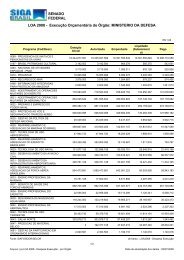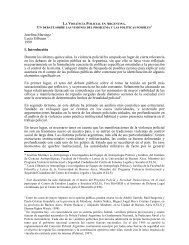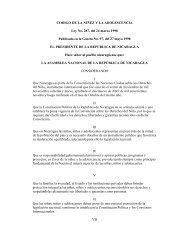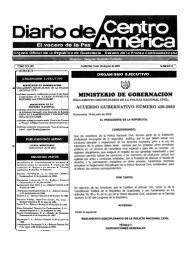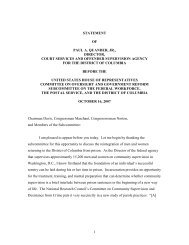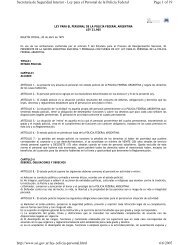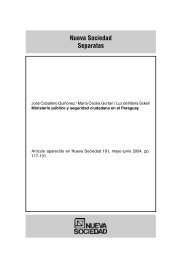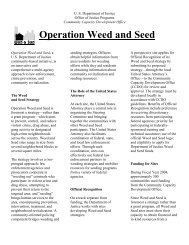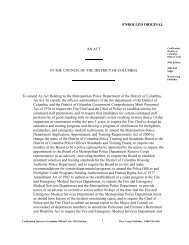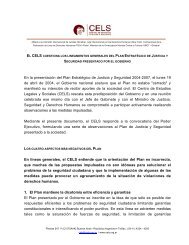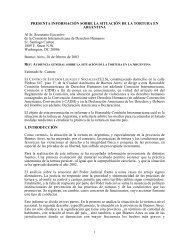Venezuela: The Life and Times of the Party System - Political ...
Venezuela: The Life and Times of the Party System - Political ...
Venezuela: The Life and Times of the Party System - Political ...
Create successful ePaper yourself
Turn your PDF publications into a flip-book with our unique Google optimized e-Paper software.
<strong>Political</strong> parties have always been at <strong>the</strong> center <strong>of</strong> modern <strong>Venezuela</strong>n democracy. For<br />
<strong>Venezuela</strong>ns, <strong>the</strong> mobilization <strong>of</strong> masses <strong>and</strong> indeed <strong>the</strong> very concept <strong>of</strong> popular democratic rule<br />
have been wrapped up with political parties from <strong>the</strong> beginning. Drawing strength from <strong>the</strong><br />
massive social changes brought by petroleum, parties brokered <strong>and</strong> encapsulated <strong>the</strong> growth <strong>of</strong><br />
all forms <strong>of</strong> mass political action in <strong>the</strong> critical early decades after 1935. <strong>The</strong>y were present at<br />
democracy’s first creation in 1945, <strong>and</strong> engineered its rebirth after 1958, combining lasting<br />
national support along with effective leadership.<br />
<strong>The</strong> survival <strong>and</strong> consolidation <strong>of</strong> this democracy was managed <strong>and</strong> ensured by political<br />
parties, as elites b<strong>and</strong>ed toge<strong>the</strong>r to defend <strong>the</strong> principle <strong>and</strong> reality <strong>of</strong> democratic government,<br />
bringing <strong>the</strong>ir mass followings along. Toge<strong>the</strong>r, elites <strong>and</strong> masses isolated <strong>and</strong> defeated<br />
opposition from military adventurers <strong>and</strong> leftist revolutionaries alike. After ten years <strong>of</strong> growing<br />
electoral dispersion, <strong>the</strong> nation’s powerful <strong>and</strong> creative party organizations turned <strong>the</strong> tide, <strong>and</strong><br />
since 1968 have crafted a strong <strong>and</strong> enduring two-party system. Most recently, <strong>the</strong>se same<br />
parties have promoted <strong>and</strong> enacted major innovations aimed at enhancing democratization<br />
through legal <strong>and</strong> political decentralization <strong>and</strong> incentives to democracy within <strong>the</strong> parties<br />
<strong>the</strong>mselves.<br />
<strong>The</strong> dominant role parties have taken in all aspects <strong>of</strong> political life has led scholars like<br />
Levine (1973) or Rey (1990) to call <strong>Venezuela</strong> a party system, <strong>and</strong> to make its character as such<br />
central not only to <strong>the</strong> origins <strong>of</strong> contemporary politics, but also to its operative rules, strengths,<br />
<strong>and</strong> weaknesses, now <strong>and</strong> in <strong>the</strong> future. In Levine’s usage, <strong>the</strong> term ‘party system’ has at least<br />
four dimensions: 1. Parties are <strong>the</strong> basic tools <strong>of</strong> political mobilization <strong>and</strong> action. 2. This<br />
ensures that mobilized consent <strong>and</strong> votes—characteristic <strong>of</strong> modern parties—will become central<br />
to legitimate politics. 3. <strong>Party</strong> domination shapes prevailing political methodology around rallies,<br />
propag<strong>and</strong>a, elections, <strong>and</strong> now mass media. And finally, 4.<br />
as parties dominate politics, <strong>the</strong>y become <strong>the</strong> principal agencies for <strong>the</strong><br />
organization <strong>and</strong> channeling <strong>of</strong> political conflicts. Conflicts are expressed<br />
primarily through political parties, <strong>and</strong> this organizational concentration opens <strong>the</strong><br />
possibility <strong>of</strong> agreement between parties on <strong>the</strong> legitimate bounds <strong>of</strong><br />
conflicts—that is, a procedural consensus on <strong>the</strong> means <strong>of</strong> limiting any given<br />
conflict becomes a possibility (Levine 1973, 35-36).<br />
We believe that <strong>Venezuela</strong>’s experience as a party system is instructive in exploring <strong>the</strong><br />
issues <strong>of</strong> how to build competitive, effective, <strong>and</strong> lasting political parties, <strong>and</strong> how to make <strong>the</strong>m<br />
central to <strong>the</strong> construction <strong>and</strong> survival <strong>of</strong> democracy. <strong>Venezuela</strong> has long been regarded as<br />
something <strong>of</strong> an outlier in contemporary Latin American politics. <strong>The</strong> abundance <strong>of</strong> money from<br />
petroleum gave leaders a valuable cushion, <strong>and</strong> <strong>the</strong> nation’s ability to sidestep <strong>the</strong> ideological<br />
polarization, organizational <strong>and</strong> political decay, <strong>and</strong> authoritarian rule so common elsewhere in



